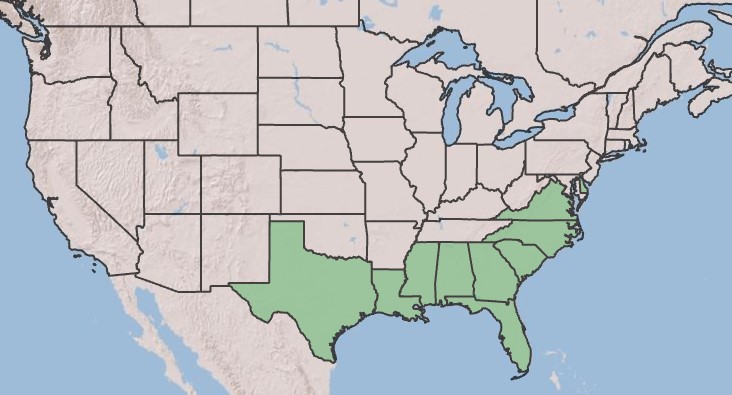Difference between revisions of "Cyrilla racemiflora"
(→Habitat) |
(→Habitat) |
||
| Line 26: | Line 26: | ||
==Ecology== | ==Ecology== | ||
===Habitat=== | ===Habitat=== | ||
| − | ''C. racemiflora'' occurs in scrub habitat and pine flatwoods with sandy soils, as well as along streams, ponds, and marshes.<ref name = fsu> Florida State University Robert K. Godfrey Herbarium database. | + | ''C. racemiflora'' occurs in scrub habitat and pine flatwoods with sandy soils, as well as along streams, ponds, and marshes.<ref name = fsu> Florida State University Robert K. Godfrey Herbarium database. URL: http://herbarium.bio.fsu.edu. Last accessed: May 2023. Collectors: Loran C. Anderson, J. Beckner, L. J. Brass, J. Carmichael, A. F. Clewell, Robert K. Godfrey, Walter S. Judd, R. Kral, H. Kurz, O . Lakela, J. B. McFarlin, James D. Ray Jr., P. L. Redfearn, Grady W. Reinert, and R. Spielman. States and counties: Florida: Calhoun, Escambia, Franklin, Gulf, Highlands, Lafayette, Lake, Leon, Liberty, Putnam, Taylor, and Wakulla.</ref> |
| − | Associated species of ''C. racemiflora'' include ''[[Quercus geminata]]'', ''[[Quercus myrtifolia]]'', ''Osmanthus sp. | + | Associated species of ''C. racemiflora'' include ''[[Quercus geminata]]'', ''[[Quercus myrtifolia]]'', ''Osmanthus'' sp., ''[[Quercus chapmanii]]'', ''[[Sabal etonia]]'', ''[[Befaria racemosa]]'', ''[[Ilex cassine]]'', and ''Asmina obovata''.<ref name=fsu/> |
<!--===Phenology===--> <!--Timing off flowering, fruiting, seed dispersal, and environmental triggers. Cite PanFlora website if appropriate: http://www.gilnelson.com/PanFlora/ --> | <!--===Phenology===--> <!--Timing off flowering, fruiting, seed dispersal, and environmental triggers. Cite PanFlora website if appropriate: http://www.gilnelson.com/PanFlora/ --> | ||
<!--===Seed dispersal===--> | <!--===Seed dispersal===--> | ||
Revision as of 12:26, 19 May 2023
| Cyrilla racemiflora | |
|---|---|
| Scientific classification | |
| Kingdom: | Plantae |
| Division: | Magnoliophyta - Flowering plants |
| Class: | Magnoliopsida - Dicots |
| Order: | Ericales |
| Family: | Cyrillaceae |
| Genus: | Cyrilla |
| Species: | C. racemiflora |
| Binomial name | |
| Cyrilla racemiflora Linnaeus | |

| |
| Natural range of Cyrilla racemiflora from USDA NRCS [1]. | |
Common name: swamp titi
Contents
Taxonomic Notes
Synonyms:
Description
Distribution
Ecology
Habitat
C. racemiflora occurs in scrub habitat and pine flatwoods with sandy soils, as well as along streams, ponds, and marshes.[1]
Associated species of C. racemiflora include Quercus geminata, Quercus myrtifolia, Osmanthus sp., Quercus chapmanii, Sabal etonia, Befaria racemosa, Ilex cassine, and Asmina obovata.[1]
Conservation, cultivation, and restoration
Cultural use
Photo Gallery
References and notes
- ↑ 1.0 1.1 Florida State University Robert K. Godfrey Herbarium database. URL: http://herbarium.bio.fsu.edu. Last accessed: May 2023. Collectors: Loran C. Anderson, J. Beckner, L. J. Brass, J. Carmichael, A. F. Clewell, Robert K. Godfrey, Walter S. Judd, R. Kral, H. Kurz, O . Lakela, J. B. McFarlin, James D. Ray Jr., P. L. Redfearn, Grady W. Reinert, and R. Spielman. States and counties: Florida: Calhoun, Escambia, Franklin, Gulf, Highlands, Lafayette, Lake, Leon, Liberty, Putnam, Taylor, and Wakulla.